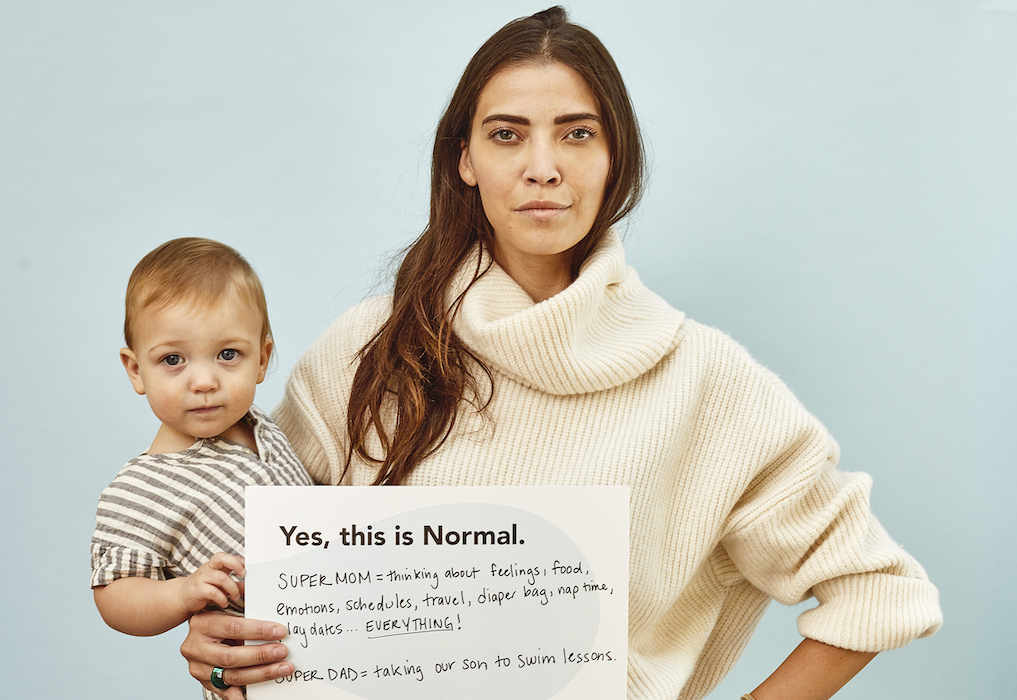Tinamarie Clark: mom of two boys, model, and life coach, who is all about turning negative experiences into something empowering. She calls this process of helping to identify and learn from negative emotions shift-stirring. Tinamarie takes “stir-stories,” or moments that an individual has found triggering, and helps people learn how to shift them into a positive experience. She named this her Five S method, and her passion for healing is refreshingly evident when she discusses her work and her experience of becoming a mother.
We asked Tinamarie to share some stories about her own personal journey as a mom. When she met up with us to talk about her life with her sons, Lexington, 1, and Maximus, 3, we were able to get a feel for how she has handled her passage into motherhood. Tinamarie’s best musings on motherhood? Trust your intuition, embrace the transitions, and sometimes it is best to sit back and observe our little ones. “They come into the world knowing a lot, when you let them be, and watch,” she says, “it is really fascinating.”
Your Old Self if Left Behind
“It’s a lot of trial and error,” Tinamarie says, when asked about the challenges that come with motherhood. The real obstacles are the messy thoughts and big emotions that arrive with the baby. And she reminds us that it’s incredibly common to lose your sense of self. “You are not the old you, you have all of these new roles…that you aren’t great at and you’re getting to know…and you’re figuring it out,” she says. “It’s an uncertain time for yourself, and you are not quite great at being…this new version of you.”
So, not only are new moms attempting to figure out how to take care of a baby, but we also have the constant struggle of finding time to get to know our new selves. However, as Tinamarie encourages, try to carve out breaks where you can address your own worries. “Whatever it is that you are avoiding paying attention to in your personal life, will show up in your children and through your children,” she says. “Your children are your biggest teachers and they are going to reveal to you what you need to work on.” This is as insightful as it is intimidating. But that’s why it’s so important to talk about it.
Partners and Resentment
Tinamarie was forthright with us about the biases that she has seen while raising her boys. She has noticed that dads are overly praised for the mundane tasks that mothers do countless times a week. “He is just doing what I do every day and I never get praised,” Tinamarie disclosed. “He is just doing one of the 50 thousand things I have done today!” And while those tasks are appreciated, the lack of balance in recognition and in the expectations of moms vs. those of dads can lead to resentment, at least for her. This is something we hear over and over here at Is This Normal – except it’s been whispered behind closed doors. “For women, it isn’t as noticed and it isn’t as celebrated,” she says. “My husband can go and take our son to a swimming lesson and he is father of the year…and I’m like, he is just doing what I do every day, where’s my cheerleader!”
The resentment that she sometimes feels wasn’t something that she expected to experienced before becoming a mom. “The disparity of roles,” Tinamarie explained, “and the definition of a “good mom” versus a “bad mom” or a “good dad” versus a “super dad,” that…delta between is so vast that it is startling.” But Tinamarie reminded us that these feelings aren’t rare or unusual, they just aren’t often talked about. “You will have unexpected, unexplainable resentment toward your partner,” she says, “about the disparity of roles.” That occasional bitterness is surprisingly normal. But what do we do about it? Some insights from our advice column here.
Postpartum Ickiness
“I love my baby but I feel weird in this new role.”
Part of Tinamarie’s work as a shift-stirrer is helping other women heal from emotional wounds. And when she had her own complications with postpartum recovery, it was with the company of other women that she found relief. “What really comforted me was other women.” She revealed. “Having them tell me- babe, it’s ok, I used to weep in my bed with my baby, I used to want to get rid of my baby and my mom took care of the baby for two months,” she says. “I had women tell me these incredible, vulnerable, sweet stories that made me feel normal when I was feeling icky…or like the worst mom…”
The worries and feelings that Tinamarie describes to us are ubiquitous. And normal. And expected. No matter how much we hear about motherhood and parenting and life after baby, nothing beats the experience. “Before, you had however many years you lived on this earth to get used to…being you,” Tinamarie says. “Post baby, you are learning all of that brand new.”



